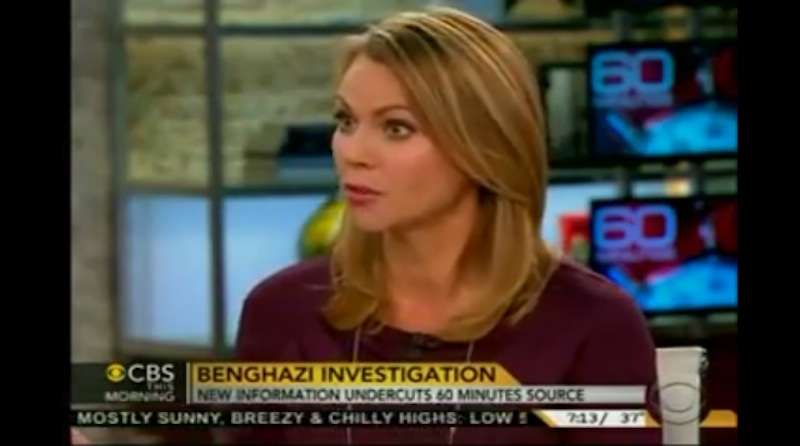I just watched the 60 Minutes “correction”/apology tonight and thought was pretty amazing for its brevity, lack of substance and general obfuscation. If you didn’t watch 60 Minutes tonight, it won’t take long. It only lasted 90s or so. And you can see it here.
In a narrow sense, Lara Logan did say she was “sorry.” But the entire 90 seconds was aimed at obfuscating what happened.
Logan said 60 Minutes had found out Thursday that they had been “misled and it was a mistake to include him in our report.”
Include him in their report? He was the report. And even in conceding that her team had been “misled”, Logan tiptoed around the real news, which is that it seems clear that Davies’ entire story was a fabrication. He wasn’t there. So none of the stuff he did could have happened and he cannot have witnessed any of what he claimed to describe.
If you’d come to this 90 seconds without knowing anything that had happened over the last couple weeks, you would probably think that one person interviewed in a 60 Minutes segment may have been misleading in some of the things he said.
This gets to the core issue. 60 Minutes allowed a complete charlatan top billing on their show. He wasn’t part of a segment. He was the segment. And the piece made a big, big splash.
Usually, when journalists deal with charlatans, it’s a tricky business because it’s usually a matter of proving a negative. You need to come up with evidence of various sorts that either proves or undermines their credibility. You seldom get so lucky as to have two independent pieces of documentary evidence that completely impeach the source’s account (first, his immediate reports to his employers and second, the later account to the FBI). Neither could have been that difficult for a news organization of CBS News’ size and heft to find since the Post and the Times got both within 10 days of the story airing.
The fact that 60 Minutes says this segment was reported for an entire year and yet failed to uncover this impeaching evidence is astounding. But the details are even worse. According to 60 Minutes’ account, they knew that Davies had written an after-action report for his employers which completely contradicted his account. But apparently he told them that he lied to his supervisors because he wasn’t supposed to go to the compound.
Occam’s Razor does not treat that explanation kindly. When are you more likely to embellish or lie? In an immediate after action report when there’s little reason to believe that your own role will ever be a matter of consequence or that the incident itself will become a topic of immense controversy? Or a year later when you write a tell-all book chronicling your exploits for a conservative book publisher and there’s fame and lots of money at stake?
At a minimum this was a big red flag. How could 60 Minutes have known there was yet another account to the FBI?
Well, apparently they did know about it but took Davies word for it when he told them that he told the “truth” to the FBI as he had in his book, rather than the “lie” he told his employers.
Now, it’s conceivable that Davies might have fibbed for whatever reason to his employers (though his explanation barely passes the laugh test). But at that point, you would definitely want to verify Davies account with the FBI. Even if he had told the heroic story to the FBI, the more immediate account would still give any good journalist serious pause. But apparently they didn’t even check it out with the FBI, even though CBS News has several reporters with great sources at DOJ and FBI. They just took his word for it – eventually though they’re relying on his book which is contradicted by his own original report. (One more detail, Davies said he lied to his employers but he also claimed he didn’t actually write the report to them. Again, how much does it take to warn these people off a liar?)
Logan’s critics have raised the fact that she seems to have very strong personal feelings about the attack and how the White House responded. I don’t know if that played a role or not. There was yet another red flag that Davies book (the publication of which has now been canceled) was published by the publisher best known for publishing Glenn Beck, Mark Levin and Jerome Corsi.
I don’t know the players involved enough to know whether this happened because of bias, indifference, arrogance or wild sloppiness. But you can’t screw up much bigger than this. At a minimum there needs to be some detailed explanation of how this big a screw could have happened. And the comparison with the aftermath of the Rather/Bush Air National Guard debacle (largely deserved in terms of who was held accountable) speaks volumes.
[Ed:Note: In response to a few questions about this post, we know that 60 Minutes knew that Davies had told a different story to his employers long before the story ran. Jeff Fager told Huffpo that. What’s a little more fuzzy to me is when they knew he’d spoken to the FBI. Fager’s and Logan’s description of their discussions with Davies suggests they knew such a report existed before broadcast, though not its contents, as do the sources quoted by Dylan Byers in this piece in Politico. It seems possible, however, that they only learned about the FBI report after the Washington Post reported his contrary statement to his employer. If anyone knows of a definitive answer to when CBS says they learned about the FBI interview, please let me know.]






